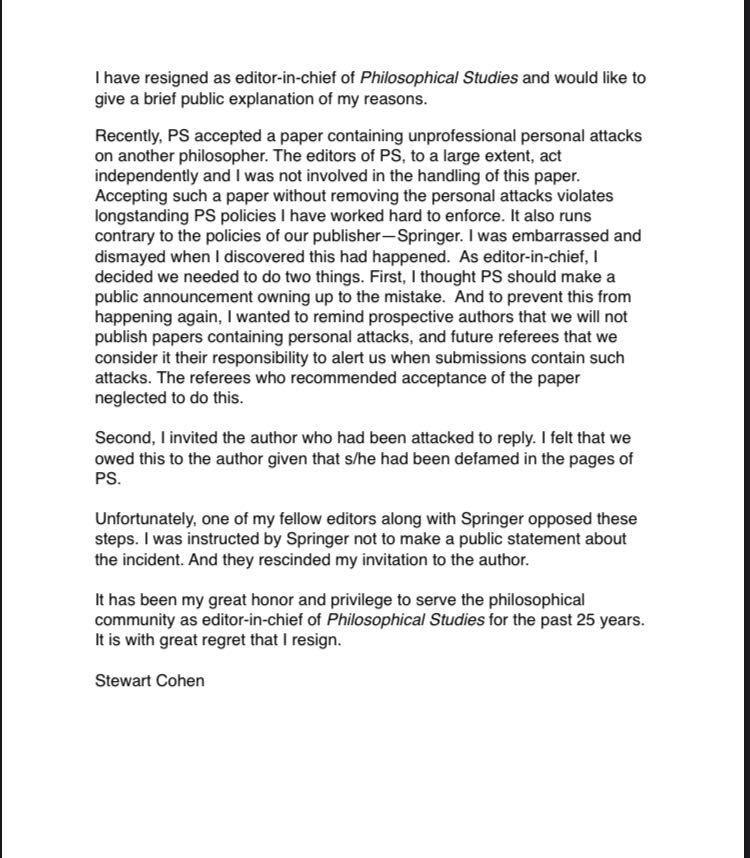Editor’s Note: This article has been updated with statements from Stewart Cohen and an expansion of a quote for clarity.
University of Arizona Professor of Philosophy Stewart Cohen resigned from his position as editor-in-chief of Philosophical Studies on Friday, June 5. Cohen edited the journal for 25 years.
Cohen said he resigned from the journal over a dispute concerning a forthcoming paper that features personal attacks against another author, which was accepted without his oversight.
RELATED: Campus reentry update: Task force talks combating the spread of COVID-19 on campus
Cohen asked Brian Leiter, professor of jurisprudence and director of the Center for Law, Philosophy and Human Values at the University of Chicago, to share his explanation for the resignation, which Leiter did on his blog.
In the letter, Cohen mentions “a paper” accepted by the journal without his involvement which featured “unprofessional personal attacks” against another philosopher. He says that these attacks run against the policies of both Philosophical Studies and Springer, the publisher of the journal.
“I know [Cohen] by reputation, not personally,” Leiter said in an email to the Daily Wildcat. “He is a leading figure in epistemology (philosophical work on the nature of knowledge) and has done, by common consensus, an exemplary job editing Philosophical Studies, one of the leading journals in English-speaking philosophy (on everyone’s “top ten” list, as it were). It is without a doubt a loss to the journal and the profession that he is stepping down.”
Though Cohen doesn’t name the specific paper he is referring to in this letter, Leiter said in an email that Cohen is referencing “Escaping the Natural Attitude About Gender” by Robin Dembroff, an assistant professor of philosophy at Yale University. This paper in Philosophical Studies is a reply to another forthcoming paper in the same journal, “Are Women Adult Human Females?” by Alex Byrne, a professor of philosophy at the Massachusetts Institute of Technology.
Dembroff’s paper abstract, “Escaping the Natural Attitude about Gender” said Byrne’s title “is a political slogan championed by anti-trans activists, appearing on billboards, pamphlets, and anti-trans online forums.”
Although journals differ in their policies for publication, Leiter said that it’s standard for a journal to “insist that the focus be on arguments, and not attacks on the motive or character of other philosophers.” He pointed out a quote from Dembroff’s paper to exemplify how the author crossed the line:
“Byrne’s paper fundamentally is an unscholarly attempt to vindicate a political slogan that is currently being used to undermine civic rights and respect for trans persons. And it is here that I return to Byrne’s advice to question the motivations behind this debate. ‘If someone is personally heavily invested in the truth of p,’ Byrne writes, ‘it is prudent to treat [their] claim that p is true with some initial caution.’ I agree. So we may ask: What are the motivations of someone who would so confidently insert themself into this high-stakes discourse while so ill-informed?”
A collection of the statements directed at Byrne from Dembroff’s paper have been compiled by Holly Lawford-Smith, senior lecturer at the University of Melbourne.
“I gathered the quotes because when I read through the article I was astounded by how unprofessional and personal it was,” Lawford-Smith said in an email to the Daily Wildcat. “I thought the passages spoke for themselves, which is why I simply listed them without commentary. I have never seen anything like it in philosophy.”
According to his resignation letter, Cohen decided that the journal needed to do two things: Publicly own up to the mistake and offer the author who had been attacked a chance to reply.
Cohen claimed these actions were opposed by the publisher as well as one of his fellow editors. He said that Springer instructed him not to make a public statement about the incident and rescinded his invitation to the author to make a reply.
“This is the first incident of this kind,” Cohen said in an email. Leiter said it’s “shocking” that the publisher or other editors wouldn’t allow Cohen to allow a response from Byrne.
“It’s fair to say that this whole episode will damage the reputation of the journal, beyond the loss of Professor Cohen,” Leiter said.
RELATED: A running list of statements made by UA organizations regarding George Floyd and protests
Lawford-Smith noted that Dembroff’s paper was announced “mere months” after Byrne’s was both announced and a draft of his paper was posted, which is significant because the process for peer review alone can take up to a year, not including the time it takes to write the paper and seek feedback before its review.
Because of this, Lawford-Smith said that it appears as though the exceptions for the reply were politically motivated.
“The fact that it went through so quickly and that the reviewers and associate editor did not pick up the problems with the violations of professional norms suggests that those involved were ideologically compromised,” Lawford-Smith said. “This is seriously worrying for academic integrity.”
A spokesperson for Philosophical Studies said, “Cohen resigned as editor-in-chief of Philosophical Studies on May 2. He is succeeded by Wayne Davis, Georgetown University, Washington, USA and Jennifer Lackey, Northwestern University, Evanston, USA.”
Follow Kristijan Barnjak on Twitter









